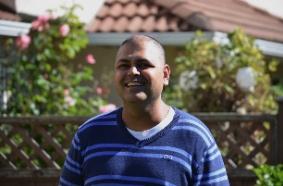A proposed seniors housing project in Vancouver for lesbian, gay, bisexual, transgender, two-spirited people and their allies is one small step closer to reality.
Three months after its inception, the Dignity House project has collected $37,000 to perform a market and feasibility study. The majority of the money came in a $20,000 grant from the Vancity Community Foundation.
“We saw that Dignity House was a good fit because there is really a need in the community, not only for seniors housing, but for the LGBT population,” says Emily Beam, manager of strategic programs at the foundation. “We saw that it was a much needed resource, and we saw an opportunity to get involved at an early stage.”
Dignity House also won $15,000 on Nov 28 from BC Ideas, a provincial competition for social innovation. The project won in the “preventing the threat of homelessness” category, a prize provided by the United Way.
Finally, says founder Alex Sangha, Dignity House has collected $2,000 in private donations. Most of the $37,000 will be used to pay a consultant to study whether queer housing is financially feasible and where and how it should be built. The six-month study will begin early in 2013.
“We hope to start building by 2014,” says CEO Charan Gill, of Progressive Intercultural Community Services (PICS), a non-profit that is backing Sangha. Gill has successfully built two seniors housing complexes in Surrey and says he is confident that Dignity House is possible.
“We only started two or three months ago. We are already ahead,” he says.
PICS, which manages Dignity House’s finances as a registered non-profit, has experience building housing for one minority without excluding anybody. While PICS’ Guru Nanak Niwas housing is focused on South Asian seniors, Gill says that people from 19 different nationalities live there.
He says he recognizes that the South Asian community has not always accepted gay people in the past, but he believes this is an opportunity to build bridges. “We want to spearhead this project to tell people we respect them as human beings, we respect their rights,” he says. “All seniors, regardless of being lesbian or gay, have a right to live a decent life when they get old.”
If the feasibility study is positive, Sangha will still need to collect funding, financing and — most challenging — property for Dignity House to become a reality. He believes the current political climate is good news for projects like his.
“I think our timing is going to be right soon,” Sangha says. “If we prepare and plan and have all our Ts and Is crossed, and economic and political changes happen and make money available for affordable housing, and we’re ready. And if we’re the only group that is ready, then we might get the funding.”
Sangha is now accepting applications for Dignity House’s advisory committee. He says he has already received 22 applications for 10 seats, but he will continue to accept applications until December. Applications, as well as the budget and documents, are available on the Dignity House Facebook group page.


 Why you can trust Xtra
Why you can trust Xtra


